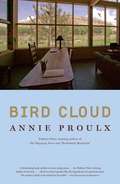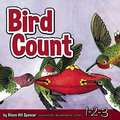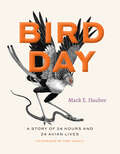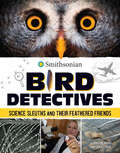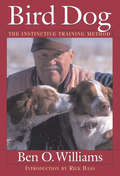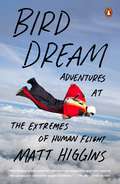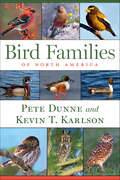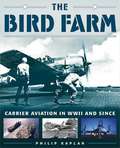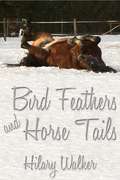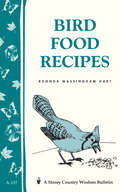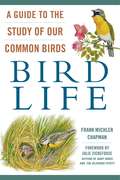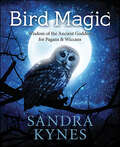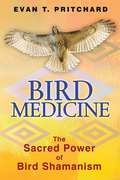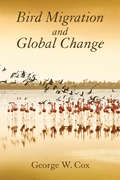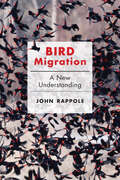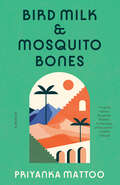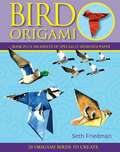- Table View
- List View
Bird Cloud: A Memoir of Place
by Annie ProulxPart autobiography, part natural history, Bird Cloud is the glorious story of Annie Proulx's piece of the Wyoming landscape and her home there."Bird Cloud" is the name Annie Proulx gave to 640 acres of Wyoming wetlands and prairie and four-hundred-foot cliffs plunging down to the North Platte River. On the day she first visited, a cloud in the shape of a bird hung in the evening sky. Proulx also saw pelicans, bald eagles, golden eagles, great blue herons, ravens, scores of bluebirds, harriers, kestrels, elk, deer and a dozen antelope. She fell in love with the land, then owned by the Nature Conservancy, and she knew what she wanted to build on it--a house in harmony with her work, her appetites and her character, a library surrounded by bedrooms and a kitchen. Bird Cloud is the story of designing and constructing that house--with its solar panels, Japanese soak tub, concrete floor, and elk horn handles on kitchen cabinets. It is also an enthralling natural history and archaeology of the region--inhabited for millennia by Ute, Arapaho, and Shoshone Indians--and a family history, going back to nineteenth-century Mississippi riverboat captains and Canadian settlers. Proulx, a writer with extraordinary powers of observation and compassion, here turns her lens on herself. We understand how she came to be living in a house surrounded by wilderness, with shelves for thousands of books and long worktables on which to heap manuscripts, research materials and maps, and how she came to be one of the great American writers of her time.
Bird Count (Adventure Boardbook Series 1-2-3)
by Alison Hill SpencerGrowing up with a father who cherished birds and traveled the world with ornithologists on birding trips, Alison Spencer has always enjoyed birds. Unable to find children's books that depicted realistic birds, she decided to create her own. This delightful, colorful book not only introduces kids to birds they might see but also reinforces count concepts. Images removed.
Bird Day: A Story of 24 Hours and 24 Avian Lives (Earth Day Ser.)
by Mark E. HauberAn hourly guide that follows twenty-four birds as they find food, mates, and safety from predators. From morning to night and from the Antarctic to the equator, birds have busy days. In this short book, ornithologist Mark E. Hauber shows readers exactly how birds spend their time. Each chapter covers a single bird during a single hour, highlighting twenty-four different bird species from around the globe, from the tropics through the temperate zones to the polar regions. We encounter owls and nightjars hunting at night and kiwis and petrels finding their way in the dark. As the sun rises, we witness the beautiful songs of the “dawn chorus.” At eleven o’clock in the morning, we float alongside a common pochard, a duck resting with one eye open to avoid predators. At eight that evening, we spot a hawk swallowing bats whole, gorging on up to fifteen in rapid succession before retreating into the darkness. For each chapter, award-winning artist Tony Angell has depicted these scenes with his signature pen and ink illustrations, which grow increasingly light and then dark as our bird day passes. Working closely together to narrate and illustrate these unique moments in time, Hauber and Angell have created an engaging read that is a perfect way to spend an hour or two—and a true gift for readers, amateur scientists, and birdwatchers.
Bird Day: A Story of 24 Hours and 24 Avian Lives (Earth Day)
by Mark E. HauberAn hourly guide that follows twenty-four birds as they find food, mates, and safety from predators. From morning to night and from the Antarctic to the equator, birds have busy days. In this short book, ornithologist Mark E. Hauber shows readers exactly how birds spend their time. Each chapter covers a single bird during a single hour, highlighting twenty-four different bird species from around the globe, from the tropics through the temperate zones to the polar regions. We encounter owls and nightjars hunting at night and kiwis and petrels finding their way in the dark. As the sun rises, we witness the beautiful songs of the “dawn chorus.” At eleven o’clock in the morning, we float alongside a common pochard, a duck resting with one eye open to avoid predators. At eight that evening, we spot a hawk swallowing bats whole, gorging on up to fifteen in rapid succession before retreating into the darkness. For each chapter, award-winning artist Tony Angell has depicted these scenes with his signature pen and ink illustrations, which grow increasingly light and then dark as our bird day passes. Working closely together to narrate and illustrate these unique moments in time, Hauber and Angell have created an engaging read that is a perfect way to spend an hour or two—and a true gift for readers, amateur scientists, and birdwatchers.
Bird Detectives: Science Sleuths And Their Feathered Friends (Smithsonian Editions Ser.)
by Kristine RiversBirds and planes don’t always get along. What can we do to help? Enter the world of forensic ornithology in this investigative nonfiction title created with the Smithsonian Institution and the Division of Birds at the National Museum of Natural History. Discover the fascinating work of leading ornithologists—"bird detectives” who use science and technology to solve bird strikes and other bird mysteries. They examine evidence from clues like feathers and snarge—pilot slang for what’s left behind after a bird strike—and create solutions to save our feathered friends and protect people and planes in flight. Discover how the study of birds shapes our world, from inspiring aviation and airfield design to increasing safety in the skies. Full of photos, case studies, fun facts, and interactive elements, this STEM exploration reveals a fascinating field of science to kids.
Bird Dog
by Ben O. WilliamsOriginally published in 2003, this one-of-a-kind dog training book is now available in softcover.Both a training manual and a hunting philosophy, Bird Dog reveals unique and time-tested methods that cultivate a dog's instincts to hunt.
Bird Dream
by Matt Higgins"[R]iveting... a must-read. A highflying, electrifying story of a treacherous sport in which every triumph is an eye blink away from becoming a disaster." --Kirkus (STARRED) A heart-stopping narrative of risk and courage, Bird Dream tells the story of the remarkable men and women who pioneered the latest advances in aerial exploration--from skydiving to BASE jumping to wingsuit flying--and made history with their daring. Bird Dream shows that recent decades have witnessed an unprecedented revolution in human flight. By the end of the twentieth century BASE jumping was the most dangerous of all the extreme sports, with thrill-seeking jumpers parachuting from bridges, mountains, radio towers, and even skyscrapers. Despite numerous fatalities and legal skirmishes, BASE jumpers like Jeb Corliss of California thought they had discovered the ultimate rush. But all this changed for Corliss in 1999, when, high in the mountains of northern Italy, he and other jumpers watched in wonder as a stranger--wearing a cunning new jumpsuit featuring "wings" between the arms and legs--leaped from a ledge and then actually flew from the vertiginous cliffs. This dude's flying, thought Corliss with a start. This changes everything. What Corliss had witnessed was a wingsuit, an innovation more flying squirrel than bird or plane. Wingsuits were not new; they had fascinated men for centuries. Yet a modern design had improved safety and performance, allowing wingsuit pilots to leap from a helicopter or high cliff and soar for miles--using little more than their bodies--before deploying a parachute to reach the ground safely. The best pilots could fly close to the earth, rapidly navigating narrow canyons and mountain ranges. Still, colossal dangers remained, and the beauty of exploring human flight with such unprecedented grace would exact the ultimate cost for some pilots--they would pay with their lives. Drawing on intimate access to Corliss and other top pilots from around the globe, Bird Dream tracks the evolution of the wingsuit movement through the larger than life characters who, in an age of viral video, forced the sport onto the world stage. Their exploits--which entranced millions of fans along the way--defied imagination. They were flying; not like the Wright brothers, but the way we do in our dreams. Some dared to dream of going further yet, to a day when a wingsuit pilot might fly, and land, all without a parachute. A growing number of wingsuit pilots began plotting ways in which a human being might leap from the sky and land. A half dozen groups around the world were dedicated to this quest for a "wingsuit landing," conjuring the pursuit of nations that once inspired the race to first summit Everest. Given his fame as a stuntman, the brash, publicity-hungry Corliss remained the popular favorite to claim the first landing. Yet Bird Dream also tracks the path of another man, Gary Connery--a forty-two-year-old Englishman--who was quietly plotting to beat Corliss at his own game. Accompanied by an international cast of wingsuit devotees--including a Finnish magician, a parachute tester from Brazil, an Australian computer programmer, a gruff hang-gliding champion-turned-aeronautical engineer, a French skydiving champion, and a South African costume designer--Corliss and Connery raced to leap into the unknown, a contest that would lead to triumph for one and nearly cost the other his life. Based on five years of firsthand reporting and original interviews, Bird Dream is the work of journalist Matt Higgins, who traveled the world alongside these extraordinary men and women as they jumped and flew in Europe, Africa, Asia, and the Americas. Offering a behind-the-scenes take on some of the most spectacular and disastrous events of the wingsuit movement, Higgins's Bird Dream is a riveting, adrenaline-fueled adventure at the very edge of human experience. Library Journal (STARRED) "[A]ction-packed... An engrossing and exhaustively researched account of extremists who challenge failure and death on a regular basis. High...
Bird Dream
by Matt Higgins"[R]iveting... a must-read. A highflying, electrifying story of a treacherous sport in which every triumph is an eye blink away from becoming a disaster." --Kirkus (STARRED)A heart-stopping narrative of risk and courage, Bird Dream tells the story of the remarkable men and women who pioneered the latest advances in aerial exploration--from skydiving to BASE jumping to wingsuit flying--and made history with their daring.Bird Dream shows that recent decades have witnessed an unprecedented revolution in human flight. By the end of the twentieth century BASE jumping was the most dangerous of all the extreme sports, with thrill-seeking jumpers parachuting from bridges, mountains, radio towers, and even skyscrapers. Despite numerous fatalities and legal skirmishes, BASE jumpers like Jeb Corliss of California thought they had discovered the ultimate rush. But all this changed for Corliss in 1999, when, high in the mountains of northern Italy, he and other jumpers watched in wonder as a stranger--wearing a cunning new jumpsuit featuring "wings" between the arms and legs--leaped from a ledge and then actually flew from the vertiginous cliffs. This dude's flying, thought Corliss with a start. This changes everything.What Corliss had witnessed was a wingsuit, an innovation more flying squirrel than bird or plane. Wingsuits were not new; they had fascinated men for centuries. Yet a modern design had improved safety and performance, allowing wingsuit pilots to leap from a helicopter or high cliff and soar for miles--using little more than their bodies--before deploying a parachute to reach the ground safely. The best pilots could fly close to the earth, rapidly navigating narrow canyons and mountain ranges. Still, colossal dangers remained, and the beauty of exploring human flight with such unprecedented grace would exact the ultimate cost for some pilots--they would pay with their lives.Drawing on intimate access to Corliss and other top pilots from around the globe, Bird Dream tracks the evolution of the wingsuit movement through the larger than life characters who, in an age of viral video, forced the sport onto the world stage. Their exploits--which entranced millions of fans along the way--defied imagination. They were flying; not like the Wright brothers, but the way we do in our dreams.Some dared to dream of going further yet, to a day when a wingsuit pilot might fly, and land, all without a parachute. A growing number of wingsuit pilots began plotting ways in which a human being might leap from the sky and land. A half dozen groups around the world were dedicated to this quest for a "wingsuit landing," conjuring the pursuit of nations that once inspired the race to first summit Everest.Given his fame as a stuntman, the brash, publicity-hungry Corliss remained the popular favorite to claim the first landing. Yet Bird Dream also tracks the path of another man, Gary Connery--a forty-two-year-old Englishman--who was quietly plotting to beat Corliss at his own game. Accompanied by an international cast of wingsuit devotees--including a Finnish magician, a parachute tester from Brazil, an Australian computer programmer, a gruff hang-gliding champion-turned-aeronautical engineer, a French skydiving champion, and a South African costume designer--Corliss and Connery raced to leap into the unknown, a contest that would lead to triumph for one and nearly cost the other his life.Based on five years of firsthand reporting and original interviews, Bird Dream is the work of journalist Matt Higgins, who traveled the world alongside these extraordinary men and women as they jumped and flew in Europe, Africa, Asia, and the Americas. Offering a behind-the-scenes take on some of the most spectacular and disastrous events of the wingsuit movement, Higgins's Bird Dream is a riveting, adrenaline-fueled adventure at the very edge of human experience.Library Journal (STARRED)"[A]ction-packed... An engrossing and exhaustively researched account of extremists who challenge failure and death on a regular basis. Highly recommended."SUSAN CASEY, autho...
Bird Families of North America
by Kevin T. Karlson Pete DunneFocusing on families and their shared traits makes bird identification easier than ever.This guide takes readers beyond merely identifying birds to understanding them. Many birders can tell the difference between a White-eyed and Bell&’s Vireo but cannot begin to describe a vireo and what distinguishes members of this family from warblers or flycatchers. The &“species by species&” approach makes it difficult to appreciate birds for what they are: members of well-organized groupings united by common traits. Putting the focus on families, and their shared characteristics, makes bird identification easier and more meaningful. More than 150 color photos illustrate the 81 bird families of the United States and Canada.
Bird Farm: Carrier Aviation and Naval Aviators?A History and Celebration
by Philip KaplanSee the excitement and danger of life on an aircraft carrier like never before. How does it feel to sit aboard a thirty-ton jet and be hurled over a ship’s bow at 140 miles per hour? And how does a deck crew coordinate its efforts to achieve such a feat every thirty seconds? Offering a rare glimpse of life aboard an aircraft carrier, The Bird Farm paints a vivid and often hair-raising portrait of military aircraft carriers and carrier crews, and of the planes and pilots who depend on them. Based on archival research and interviews with veterans and contemporary carrier personnel, this stunning volume tells the story of the aircraft carrier--from the first ramshackle seaplane carriers to today’s nuclear-powered supercarriers--and celebrates their undeniable impact on modern warfare. Skyhorse Publishing, as well as our Arcade imprint, are proud to publish a broad range of books for readers interested in history--books about World War II, the Third Reich, Hitler and his henchmen, the JFK assassination, conspiracies, the American Civil War, the American Revolution, gladiators, Vikings, ancient Rome, medieval times, the old West, and much more. While not every title we publish becomes a New York Times bestseller or a national bestseller, we are committed to books on subjects that are sometimes overlooked and to authors whose work might not otherwise find a home.
Bird Feathers and Horse Tails
by Hilary WalkerThis enchanting collection contains three short flash stories and one poem designed to be read while curled up in a comfy chair.Enjoy the romance of a stranger communing with a wild bird in Lugano, Switzerland. A governess cart ride through the snow to Midnight Mass at Christmas. The antics of a foal as he encounters snow for the first time. And dastardly deeds at the local horse barn!
Bird Feet (Fountas & Pinnell Classroom)
by Christine PetersonI'll Take Two, Please! Want to be the fastest runner on two legs? You'll need ostrich feet for that. NIMAC-sourced textbook
Bird Food Recipes: Storey Country Wisdom Bulletin A-137 (Storey Country Wisdom Bulletin Ser.)
by Rhonda Massingham HartSince 1973, Storey's Country Wisdom Bulletins have offered practical, hands-on instructions designed to help readers master dozens of country living skills quickly and easily. There are now more than 170 titles in this series, and their remarkable popularity reflects the common desire of country and city dwellers alike to cultivate personal independence in everyday life.
Bird Girl: Gene Stratton-Porter Shares Her Love of Nature with the World
by Jill EsbaumThis lively STEAM picture book is about the life of Gene Stratton-Porter, a pioneering wildlife photographer and popular author from the late 19th and early 20th century, who showed the world the beauty of nature, especially birds, and why it was worth preserving.Gene Stratton-Porter was a farm girl who fell in love with birds, from the chickens whose eggs she collected to the hawks that preyed on them. When she grew up, Gene wanted nothing more than to share her love of birds with the world. She wrote stories about birds, but when a magazine wanted to publish them next to awkward photos of stuffed birds, she knew she had to take matters into her own hands. Teaching herself photography, Gene began to take photos of birds in the wild. Her knowledge of birds and how to approach them allowed her to get so close you could count the feathers of the birds in her photos. Her work was unlike anything Americans had ever seen before—she captured the true lives of animals in their natural habitat. A pioneering wildlife photographer and one of the most popular authors of the early 20th century, this bird girl showed the world the beauty of nature and why it was worth preserving.
Bird Life: A Guide to the Study of Our Common Birds
by Julie Zickefoose Frank Michler ChapmanFrom the sparrow to the starling, the woodpecker to the warbler, the eagle to the egret, and every species in between, birds are some of the most plentiful and most diverse creatures in North America. Soaring high above us, these winged beauties have long been a source of fascination and enchantment. While dozens of studies and field guides have been written, few provide a better-rounded overview of the denizens of the sky than Frank Michler Chapman’s Bird Life. First published in 1897, over a century later Bird Life stills provides insightful observations about dozens of species of birds native to North America. A pioneer in the study of natural history and ornithology, Frank Chapman writes with scientific prowess and an expert’s eye in regards to bird anatomy, migratory patterns, mating habits, and habitat choice. Describing species from across the continent, Bird Life is a true testament to one of the nation’s most beloved creatures.
Bird Love: The Family Life of Birds
by Wenfei TongA stunningly illustrated look at the mating and parenting lives of the world's birdsBird Love looks at the extraordinary range of mating systems in the avian world, exploring all the stages from courtship and nest-building to protecting eggs and raising chicks. It delves into the reasons why some species, such as the wattled jacana, rely on males to do all the childcare, while others, such as cuckoos and honeyguides, dump their eggs in the nests of others to raise. For some birds, reciprocal promiscuity pays off: both male and female dunnocks will rear the most chicks by mating with as many partners as possible. For others, long-term monogamy is the only way to ensure their offspring survive.The book explores the wide variety of ways birds make sure they find a mate in the first place, including how many male birds employ elaborate tactics to show how sexy they are. Gathering in leks to display to females, they dance, pose, or parade to sell their suitability as a mate. Other birds attract a partner with their building skills: female bowerbirds rate brains above beauty, so males construct elaborate bowers with twig avenues and cleared courtyards to impress them.Looking at the differing levels of parenting skills across species around the world, we see why a tenth of bird species, including the fairy-wrens of Australia, have helpers at the nest who forgo their own reproduction to assist the breeding pair; how brood parasites and their hosts have engaged in evolutionary arms races; and how monogamous pairs share—or relinquish—their responsibilities.Illustrated throughout with beautiful photographs, Bird Love is a celebration of the global diversity of avian reproductive strategies.
Bird Magic: Wisdom of the Ancient Goddess for Pagans & Wiccans
by Sandra KynesConnect to the Great Goddess through the Magic of BirdsBirds have been symbolic of the Great Goddess for millennia, representing her power and connection to the mysteries of life, death, and spirit. Bird Magic teaches you how to commune with the Goddess, incorporating her into your magical life through exercises, crafts, meditations, and more.Working with bird magic helps awaken your intuition, tap into subtle energies around you, and strengthen your bond with the natural world. Providing an encyclopedic listing of more than sixty bird species—highlighting each one's history, folklore, location, appearance, and magical wisdom—Bird Magic shows how they can enhance your spiritual and personal life. With in-depth information, helpful illustrations, and hands-on guidance, this book will be your go-to reference for years to come.
Bird Medicine: The Sacred Power of Bird Shamanism
by Evan T. PritchardExplores the living spiritual tradition surrounding birds in Native American culture • Pairs scholarly research with more than 200 firsthand accounts of bird signs from traditional Native Americans and their descendants • Examines the legends, wisdom, and powers of the birds known as the gatekeepers of the four directions—Eagle, Hawk, Crow, and Owl • Provides many examples of bird sign interpretations and human-bird communication that can be applied in your own encounters with birds Birds are our strongest allies in the natural world. Revered in Native American spirituality and shamanic traditions around the world, birds are known as teachers, guardians, role models, counselors, healers, clowns, peacemakers, and meteorologists. They carry messages and warnings from loved ones and the spirit world, report deaths and injuries, and channel divine intelligence to answer our questions. Some of their “signs” are so subtle that one could discount them as subjective, but others are dramatic enough to strain even a skeptic’s definition of coincidence. Pairing scholarly research with more than 200 firsthand accounts of bird encounters from traditional Native Americans and their descendants, Evan Pritchard explores the living spiritual tradition surrounding birds in Native American culture. He examines in depth the birds known as the gatekeepers of the four directions--Eagle in the North, Hawk in the East, Crow in the South, and Owl in the West--including their roles in legends and the use of their feathers in shamanic rituals. He reveals how the eagle can be a direct messenger of the Creator, why crows gather in “Crow Councils,” and how shamans have the ability to travel inside of birds, even after death. Expanding his study to the wisdom and gifts of birds beyond the four gatekeepers, such as hummingbirds, seagulls, and the mythical thunderbird, he provides numerous examples of everyday bird sign interpretations that can be applied in your own encounters with birds as well as ways we can help protect birds and encourage them to communicate with us.
Bird Migration Across the Himalayas
by Prins Herbert H. T. Tsewang NamgailBirds migrating across the Himalayan region fly over the highest peaks in the world, facing immense physiological and climatic challenges. The authors show the different strategies used by birds to cope with these challenges. Many wetland avian species are seen in the high-altitude lakes of the Himalayas and the adjoining Tibetan Plateau, such as Bar-Headed Geese. Ringing programmes have generated information about origins and destinations, and this book is the first to present information on the bird's exact migratory paths. Capitalising on knowledge generated through satellite telemetry, the authors describe the migratory routes of a multitude of birds flying over or skirting the Himalayas. The myriad of threats to migratory birds and the wetland system in the Central Asian Flyway are discussed, with ways to mitigate them. This volume will inform and persuade policy-makers and conservation practitioners to take appropriate measures for the long-term survival of this unique migration.
Bird Migration and Global Change
by George W. CoxChanges in seasonal movements and population dynamics of migratory birds in response to ongoing changes resulting from global climate changes are a topic of great interest to conservation scientists and birdwatchers around the world. Because of their dependence on specific habitats and resources in different geographic regions at different phases of their annual cycle, migratory species are especially vulnerable to the impacts of climate change. In Bird Migration and Global Change, eminent ecologist George W. Cox brings his extensive experience as a scientist and bird enthusiast to bear in evaluating the capacity of migratory birds to adapt to the challenges of a changing climate. Cox reviews, synthesizes, and interprets recent and emerging science on the subject, beginning with a discussion of climate change and its effect on habitat, and followed by eleven chapters that examine responses of bird types across all regions of the globe. The final four chapters address the evolutionary capacity of birds, and consider how best to shape conservation strategies to protect migratory species in coming decades. The rate of climate change is faster now than at any other moment in recent geological history. How best to manage migratory birds to deal with this challenge is a major conservation issue, and Bird Migration and Global Change is a unique and timely contribution to the literature.
Bird Migration: A New Understanding
by John H. RappoleA fascinating and nuanced exploration of why, how, and which birds migrate.Bird migration captivates the human imagination, yet for most of us, key aspects of the phenomenon remain a mystery. How do birds sense the ideal moment to take wing, and once the epic journey has begun, how do they find their distant destinations? Fresh insights about avian movements are still constantly emerging, powered by new tools like molecular genetics and transmitter miniaturization. In this book, renowned ornithologist and author John H. Rappole reveals intriguing results of recent scientific studies on migration, explaining their importance for birders, nature lovers, and researchers alike. Debunking misconceptions about the lives of birds that have persisted for thousands of years, Rappole explores unexpected causes and previously misunderstood aspects of the annual migration cycle. From the role of migrating birds in zoonotic disease transmission to climate change's impact on migration patterns, Rappole tackles crucial questions and ensures that readers come away with a new understanding of why and how birds migrate.
Bird Milk & Mosquito Bones: A Memoir
by Priyanka MattooFrom a wry, insightful, and very funny new voice, here is one woman&’s search for home, from Kashmir to England to Saudi Arabia to Michigan to Rome and, finally, to Los Angeles—standalone essays that together form a sweeping portrait of a peripatetic life."I would follow Priyanka Mattoo to the ends of the earth, because she would know what to eat there, and how to make a friend, and then sit me down and tell me a story." —Emma StraubPriyanka Mattoo was born into a wooden house in the Himalayas, as were most of her ancestors. In 1989, however, mounting violence in the region forced Mattoo&’s community to flee. The home into which her family poured their dreams was reduced to a pile of rubble.Mattoo never moved back to her beloved Kashmir—because it no longer existed. She and her family just kept packing and unpacking and moving on. In forty years, Mattoo accumulated thirty-two different addresses, and she chronicles her nomadic existence with wit, wisdom, and an inimitable eye for light within the darkest moments. She takes us from her grandparents&’ sprawling home in Srinagar, where her boisterous aunties raced through the halls, to Saudi Arabia, where friendships were gained and lost behind the sandstone walls of a foreigners&’ compound. We witness her courtship with a nice Jewish boy, now her husband, and her efforts to replicate her mother&’s rogan josh recipe via Zoom. And we are with her as she settles into her unlikely new homeland, Los Angeles, where she sets off on what is perhaps her most meaningful journey: that of becoming a writer.Through these astonishingly poignant and often laugh-out loud essays, Mattoo has given us an openhearted, frank, revealing glimpse into a journey of almost constant motion, as well as a journey of self-discovery.
Bird Origami (Origami Books)
by Seth FriedmanBirds of a feather flock together in Bird Origami!Bird Origami will have you folding paper like a duck takes to water. You won't have to wing it when you follow the detailed, illustrated instructions to flush out twenty popular species, including mallards, hummingbirds, sparrows, seagulls, and finches. Specially designed paper makes these beauties realistic! Field guide information introduces each species, from crows to cardinals, from pelicans to geese. The bluebird of happiness will be singing from your fingers in no time!
Bird Photographer of the Year: Collection 9
by Will Nicholls and Paul SterryA stunningly illustrated celebration of the world&’s best bird photographyThe Bird Photographer of the Year is a competition that celebrates the artistry of bird photography from around the world, and this beautiful, large-format book showcases the best images from the contest—some of the most stunning bird photographs ever taken. A gorgeous record of avian beauty and diversity across the globe, the book demonstrates the dedication and passion of bird photographers and the incredible quality of today&’s digital imaging systems.The book features the best of tens of thousands of images from the ninth year of the competition, including the winning and short-listed pictures. It presents a vast variety of photos by experienced professionals and enthusiastic amateurs, reflecting the huge diversity of bird and nature lovers, which is vital for ensuring the conservation and survival of birds. A portion of the profits from this book goes to Birds on the Brink, a charity that supports bird conservation around the world.Filled with unforgettable images of a kind that simply weren&’t possible before the creation of digital photography, this book will delight anyone who loves birds or great photography.
